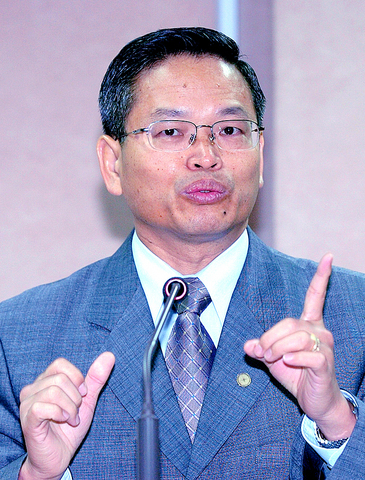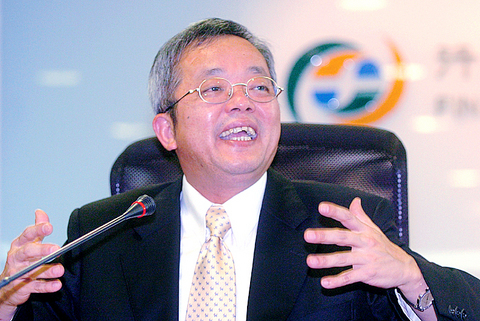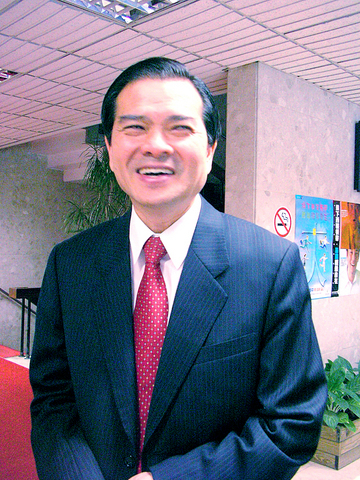Premier Su Tseng-chang (蘇貞昌) yesterday announced a new Cabinet line-up, changing key posts with a heavy focus on economics.
The premier introduced nine incoming Cabinet members, most notably new minister of economic affairs Steve Chen (陳瑞隆), an outgoing vice minister of the economic affairs. Financial Supervisory Commission (FSC) chairman Shih Jun-ji (施俊吉), a outgoing policymaking member of the FSC; and Taiwan Stock Exchange Corp (TSE) chairman Gordon Chen (陳樹), a outgoing vice minister of finance.
The new appointments allow the premier to better make his mark on the Cabinet, as all of the appointees replace people who had been chosen by President Chen Shui-bian (陳水扁).

PHOTO: CHU PEI-HSIUNG, TAIPEI TIMES
A high-ranking Cabinet official who spoke on condition of anonymity said that there were a number of reasons for Su to shuffle the posts at this time.
First, the official said, as this is the first shuffle since the president announced in June that he would no longer be involved in Cabinet affairs, it consolidates Su's authority as premier.
Also, the Conference on Sustaining Taiwan's Economic Development held last week provided Su with a good opportunity to focus on economic issues.

PHOTO: LO PEI-DER, TAIPEI TIMES
Finally, Su is leaving for a visit to Chad tomorrow.
When asked whether Chen had been notified of the new personnel arrangements, Su said that the president had already authorized him to take action.
"He [the president] cares about this issue, for sure. But he told me already that I was fully authorized to take care of this myself. When my decision was made, I reported it to the president at the first opportunity," Su said.

PHOTO: TSENG HUI-WEN, TAIPEI TIMES
Among the new posts, the FSC chairmanship was among the most discussed yesterday, because former chairman Kong Jaw-sheng (
However, Su said that recent decisions involving a media watchdog agency gave him the legal authority to appoint a new FSC chief, even though Kong had not resigned.
"According to applicable personnel laws, in the event that someone is suspended, the position will be regarded as a vacancy that can be filled," Su said. "The FSC chairman's spot cannot be left vacant forever."
As of press time, Kong had not said whether he would legally challenge the new appointment.
Other appointments include Research, Development and Evaluation Commission (RDEC) minister Shih Nun-jeh (施能傑), vice minister of the interior Lin Mei-chu (林美珠), Directorate-General of Budget, Accounting and Statistics vice minister Lu Du-chin (鹿篤瑾), RDEC vice minister Liu Chien-hsin (劉建忻), TSE general manager Hsu Jen-shou (許仁壽) and GRETAI Securities Market chairman Lu Daung-yen (呂東英).
Meanwhile, additional Cabinet appointments will be made when Su returns to Taiwan after his visit to Chad, Cabinet officials said.
also see stories:
Steve Chen outlines economic goals
New FSC chief vows to rebuild trust in watchdog
Gordon Chen appointed stock exchange chairman

MAKING WAVES: China’s maritime militia could become a nontraditional threat in war, clogging up shipping lanes to prevent US or Japanese intervention, a report said About 1,900 Chinese ships flying flags of convenience and fishing vessels that participated in China’s military exercises around Taiwan last month and in January last year have been listed for monitoring, Coast Guard Administration (CGA) Deputy Director-General Hsieh Ching-chin (謝慶欽) said yesterday. Following amendments to the Commercial Port Act (商港法) and the Law of Ships (船舶法) last month, the CGA can designate possible berthing areas or deny ports of call for vessels suspected of loitering around areas where undersea cables can be accessed, Oceans Affairs Council Minister Kuan Bi-ling (管碧玲) said. The list of suspected ships, originally 300, had risen to about

DAREDEVIL: Honnold said it had always been a dream of his to climb Taipei 101, while a Netflix producer said the skyscraper was ‘a real icon of this country’ US climber Alex Honnold yesterday took on Taiwan’s tallest building, becoming the first person to scale Taipei 101 without a rope, harness or safety net. Hundreds of spectators gathered at the base of the 101-story skyscraper to watch Honnold, 40, embark on his daredevil feat, which was also broadcast live on Netflix. Dressed in a red T-shirt and yellow custom-made climbing shoes, Honnold swiftly moved up the southeast face of the glass and steel building. At one point, he stepped onto a platform midway up to wave down at fans and onlookers who were taking photos. People watching from inside

Japan’s strategic alliance with the US would collapse if Tokyo were to turn away from a conflict in Taiwan, Japanese Prime Minister Sanae Takaichi said yesterday, but distanced herself from previous comments that suggested a possible military response in such an event. Takaichi expressed her latest views on a nationally broadcast TV program late on Monday, where an opposition party leader criticized her for igniting tensions with China with the earlier remarks. Ties between Japan and China have sunk to the worst level in years after Takaichi said in November that a hypothetical Chinese attack on Taiwan could bring about a Japanese

The WHO ignored early COVID-19 warnings from Taiwan, US Deputy Secretary of Health and Human Services Jim O’Neill said on Friday, as part of justification for Washington withdrawing from the global health body. US Secretary of State Marco Rubio on Thursday said that the US was pulling out of the UN agency, as it failed to fulfill its responsibilities during the COVID-19 pandemic. The WHO “ignored early COVID warnings from Taiwan in 2019 by pretending Taiwan did not exist, O’Neill wrote on X on Friday, Taiwan time. “It ignored rigorous science and promoted lockdowns.” The US will “continue international coordination on infectious